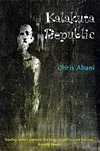
Kalakuta Republic
By Chris Abani
This collection of poems might be hard to find. Abani was a prodigy; as a teenager, he wrote his first novel, but eventually somebody in the Nigerian government said he was a subversive, so he was thrown in jail for six months, where he was tortured. He wasn't a political person, but that experience woke him up. He became involved with other like-minded people and was imprisoned again. Abani is now a novelist and poet and teaches at the University of California, Riverside. In spite of his experiences, he doesn't seem bitter. Everybody suffers at some point or knows someone who suffers, and it's how you behave when things aren't going well that tells the most about your character. That's what impressed me—his grace and compassion in the face of suffering more horrible than most of us will ever even dream of experiencing. And he's turned it into art.
By Chris Abani
This collection of poems might be hard to find. Abani was a prodigy; as a teenager, he wrote his first novel, but eventually somebody in the Nigerian government said he was a subversive, so he was thrown in jail for six months, where he was tortured. He wasn't a political person, but that experience woke him up. He became involved with other like-minded people and was imprisoned again. Abani is now a novelist and poet and teaches at the University of California, Riverside. In spite of his experiences, he doesn't seem bitter. Everybody suffers at some point or knows someone who suffers, and it's how you behave when things aren't going well that tells the most about your character. That's what impressed me—his grace and compassion in the face of suffering more horrible than most of us will ever even dream of experiencing. And he's turned it into art.
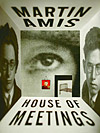
House of Meetings
By Martin Amis
When I was in England, playing a Russian in the film Eastern Promises, I read and reread lots of Russian literature and poetry. Then this book came out. Amis creates a particular world, a place where, even when overt torture isn't happening, there's a certain atmosphere of brutality. The novel traces the reminiscences of an old man, one of two brothers sent to a Gulag in Siberia who both loved the same woman. It's about jealousy. It's about violence and confession. And it's also about resistance—how the brothers support and betray each other—and how the woman is a victim of their callousness. It's an interesting character study, and one of Amis's leanest pieces of writing.
By Martin Amis
When I was in England, playing a Russian in the film Eastern Promises, I read and reread lots of Russian literature and poetry. Then this book came out. Amis creates a particular world, a place where, even when overt torture isn't happening, there's a certain atmosphere of brutality. The novel traces the reminiscences of an old man, one of two brothers sent to a Gulag in Siberia who both loved the same woman. It's about jealousy. It's about violence and confession. And it's also about resistance—how the brothers support and betray each other—and how the woman is a victim of their callousness. It's an interesting character study, and one of Amis's leanest pieces of writing.
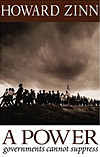
A Power Governments Cannot Suppress
By Howard Zinn
I love Howard Zinn. This collection of essays is a great book for anybody who wants to be better informed about history, regardless of their political point of view. I think Zinn is one of the most responsible, lively, and brave commentators on U.S. history now living. He's constantly sounding the wake-up call, and we owe it to ourselves and our children to listen.
By Howard Zinn
I love Howard Zinn. This collection of essays is a great book for anybody who wants to be better informed about history, regardless of their political point of view. I think Zinn is one of the most responsible, lively, and brave commentators on U.S. history now living. He's constantly sounding the wake-up call, and we owe it to ourselves and our children to listen.
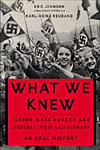
What We Knew
By Eric A. Johnson and Karl-Heinz Reuband
A number of books have been written about Germany between roughly 1933, when Hitler came to power, and the end of the Third Reich. But this collection of oral histories of Jews and "Ordinary Germans" is impossible to put down. It helps put in context the ambivalence and slowness of citizens to react to Hitler's ruinous rise and domination. You realize that Germans never imagined that Hitler would so rapidly and profoundly change the system. It's not an easy thing to answer today—why people didn't resist more—but this book has made me think a lot about our times. Damaging changes and loss of civil liberties, of popular voices of dissent, can occur rapidly, with dire consequences, as has been seen in the East and West in recent years. This book serves as a practical lesson in history and a warning for the future.
By Eric A. Johnson and Karl-Heinz Reuband
A number of books have been written about Germany between roughly 1933, when Hitler came to power, and the end of the Third Reich. But this collection of oral histories of Jews and "Ordinary Germans" is impossible to put down. It helps put in context the ambivalence and slowness of citizens to react to Hitler's ruinous rise and domination. You realize that Germans never imagined that Hitler would so rapidly and profoundly change the system. It's not an easy thing to answer today—why people didn't resist more—but this book has made me think a lot about our times. Damaging changes and loss of civil liberties, of popular voices of dissent, can occur rapidly, with dire consequences, as has been seen in the East and West in recent years. This book serves as a practical lesson in history and a warning for the future.
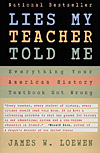
Lies My Teacher Told Me
By James W. Loewen
In this critique of high school history books, the chapter that affected me most was called "Red Eyes." It traces a more expansive history of Native Americans in this country—beyond Squanto and the first Thanksgiving. It's often difficult to develop a real sense of the United States and its place in the world. That's why I'm interested in writers who devote their professional lives to informing themselves—and, by extension, us.
By James W. Loewen
In this critique of high school history books, the chapter that affected me most was called "Red Eyes." It traces a more expansive history of Native Americans in this country—beyond Squanto and the first Thanksgiving. It's often difficult to develop a real sense of the United States and its place in the world. That's why I'm interested in writers who devote their professional lives to informing themselves—and, by extension, us.




